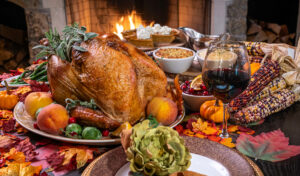In the Western world, a huge fortune is squandered every day. While we do not see people setting fire to their hard-earned cash on a daily basis, we do know that around a third of the food we spend our precious money on goes in the bin, and that is almost as bad.
With the busy lifestyles that most people lead today, it’s all too easy to buy too much food. You are at work all day, with maybe just an hour off for lunch, so the only time available for food-shopping will be after work, when you are tired and hungry – the worst possible frame of mind to be in when shopping for food. Consequently, you are more easily tempted to buy items you would not normally buy. The downside to this is that you end up with cupboards and a refrigerator full of food that won’t get used.
Earlier generations did not waste food in the same way that we do; they grew their own fruit and vegetables, used cuts of meat that we would not dream of using, baked their own bread and cakes, and saved all the leftovers. In many cases, they would roast a big piece of meat on a Sunday, and use the leftovers for meals for the rest of the week. They had little money, but plenty of time. Today, for most people, time is an elusive commodity but, if we want to avoid throwing away perfectly good food at the end of every week, we need to re-organise what time we have.
The food we throw away is not limited to the obvious, like meat bones or fruit and vegetable peelings – although, apart from the bones, these can be put to further use in the compost bin – it includes items we don’t even get around to unwrapping – things like yoghurts, fruit juices, even milk. We even let food sit at the back of the refrigerator because we can find no immediate use for it. Eventually, it finds its way into the bin, too.
With a little planning, you can work out strategies that ensure that you use everything you buy. Instead of racing around the supermarket, picking up whatever grabs your attention, you can work to a meal plan. Planning meals a week at a time, and shopping according to that plan, will ensure that you buy only what you need. When you shop in a hurry, you may find that you end up in the kitchen with lots of different items but nothing with which to conjure up a complete meal.
Buying meat that goes unused is one of the biggest sins, because meat is so expensive. You can still buy more than you think you need but, instead of plonking it straight into the refrigerator, you can re-pack it into meal-sized portions and place it in the freezer. That way, it won’t start to deteriorate. The same goes for those occasions when you find a real bargain in the meat department and buy in bulk. Stored properly, it won’t need to be wasted or discarded
Getting into the habit of thinking of the following day’s meal the night before, will ensure that you take the ingredients you need from the freezer in good time. Preparing the vegetables needed for the evening meal in the morning, before work, will mean that you have everything ready to start the meal off as soon as you get home. This will be a real luxury on days when you have to do unexpected overtime at work.
You can also save money by keeping an eye on how much food gets left on plates. If you find you are serving portions that are too large, start reducing them. The family will still be getting enough to eat, and you will soon start noticing how much further your stock of food goes. If you find it difficult to cut down on the amount of food you prepare, use the excess to make another meal; plated up and stored in the freezer, it will provide an emergency meal for a family member who is late arriving home from work or school.
When you have finished serving, think about what you can do with any food that is left over. Small amounts can be incorporated into other meals; for example, left over cabbage can be combined with cooked potatoes to make bubble-and-squeak, or cooked tomatoes can become part of the following evening’s pasta dish.
Read also Five Easy Ways To Save Money On Food Bills
Our grandparents would not have considered throwing food into the bin. They made the best use of everything because it was a lot harder to come by than it is today. We have convenience stores open around the clock, freezers and refrigerators, and a vast choice of materials in which to wrap and store our food. They had none of these luxuries, which meant they had to eat whatever was available, whether they fancied it or not.
We already know the cost to our wallets of over-buying, but there is a cost to the environment, too. Most of the food we eat has to be transported to a place of preparation and processing, then it has to be transported to our stores. We can do our bit to alleviate the environmental cost of all this if we were more careful about how we use the food we buy. If we stopped wasting so much of it, the benefits to us, our families, our finances and to the environment, could be huge.
Plan before you shop, think before you buy, and use and store appropriately; your new relationship with food will soon be saving you money.









